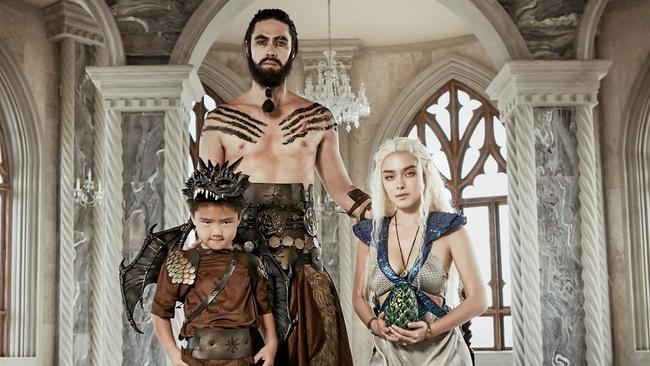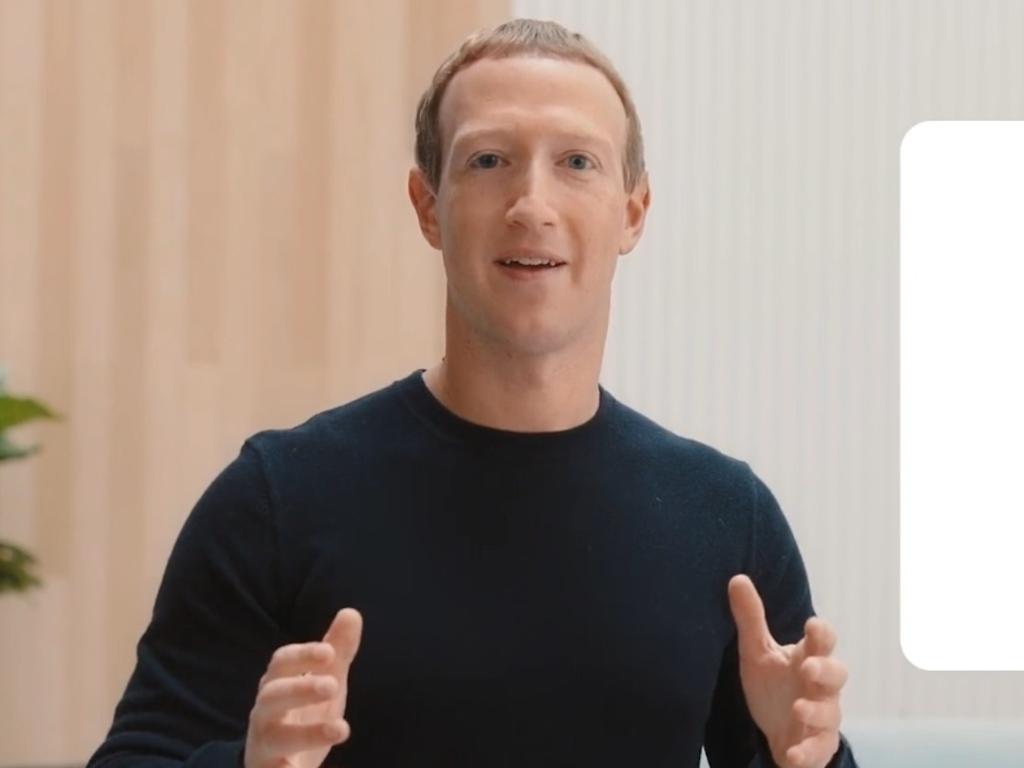What age should parents hand over their child’s Instagram account?
As kidfluencers rack up followings worth hundreds of thousands in advertising revenue, a critical question looms: who owns the content?

The first photo ever posted on Instagram looks a lot like the pictures our boomer parents send us: it’s slightly blurry, there are random objects in it – in this case it’s a foot – and its heroine, a dog, has its paw cut off.
It’s safe to say its poster, Instagram co-founder and former CEO Kevin Systrom has gotten a little better at taking pictures since then … although he still breaks traditional headspace rules.
Mr Systrom’s most recent photo, posted 186 weeks ago, includes a photo of his daughter Freya, now three years old.
Like most children photographed and plastered over the app by Gen X and millennial parents, Freya wasn’t able to consent to the picture being taken or posted.
And that, in some cases, can present a problem.
In August this year, Spencer Elden, the baby on Nirvana's album cover Nevermind, sued the band for sexual exploitation. His argument was that the picture, which depicts him at the age of four months, nude and underwater with a $1 bill, constitutes child pornography.
If Instagram was a child, it’d be 11 years old. Old enough to know what the app is and how to use it but too young for Instagram‘s policy that users be at least 13.
While it may be safe to assume there are few pictures like that of Mr Elden posted on Instagram, as those whose lives have been plastered all over the app come of age, what happens to those photos? For those who have their own dedicated accounts, who becomes the owner?
“The answer to that question is actually incredibly complex,” says tech lawyer Nicole Murdoch, a Brisbane-based partner of EagleGate Lawyers and a former IT worker.
“If the parent took the photos they probably own the copyright to the images, but in terms of the child demanding the handover, it’ll depend on what is occurring,” she said.
If a child was unhappy that their parents had uploaded photos from pictures in nappies to Halloween costumes and photos while bathing, they could argue the photos breach a privacy law.
If the parents refused to take it down, that’s when an issue arises.
Ms Murdoch said one of the fastest ways to have photos removed would be to consider anti-bullying laws.
“One way to go about it would be to complain to the eSafety Commissioner, they then may direct the service provider to take it down,” she said. “If they won’t take it down and cannot get consent from parents, then they could proceed to court.”
What happens when an issue of money is involved?
The most famous Australian in Thailand, Matthew Deane, a 43-year-old singer, actor and Thai boxing MC, has an online following of some 6.2 million between him, his wife and two kids on Instagram.
His youngest child Demi, who recently turned two, has more followers than ABC Australia, racking up 815,000 since her account’s first post on August 16, 2019.
Her big brother, Dylan, 5, has a following 6½ times that of the Australian Financial Review and more than three times that of the Sydney Morning Herald at 389,000.
His mum Lydia, a singer and actor, has the most impressive following of all, with 4.6 million loyal fans on the Facebook-owned platform. Deanne has 1 million himself.
For the Deane family, social media has become a part of the way they earn their income.
“Our social media accounts are a lot of the times linked to our product contracts,” they said. “For example, if we are the brand ambassadors of a certain brand, they would request for us to post content on (all of) our social media accounts.”
On Instagram you’ll find Demi and Dylan in commercials for the likes of Merries, a Japanese brand of nappy, to Grab, a southeast Asian rideshare and delivery company.
While the kids may not be the stars of most of these commercials, in many they play a leading role, adding significant value and a family image for the brands. The Deanes are well aware of this. It’d be naive to think they hadn’t capitalised on it, as any celebrity family would.
“Dylan and Demi have been in the spotlight since they were inside my womb. They were born into a life where cameras, press, and having their names known to strangers, are considered a normal part of daily life,” Ms Deane said.
“Sometimes it is hard to define the line between being a public figure and having enough privacy, even for us adults.
“There is definitely an element of danger from being in the spotlight, but as parents who have vast experience working in the entertainment business and dealing with its ups and downs and working with social media, we feel we can prepare them quite well.”
The Deanes point out that the kids have grown up in this environment.
“They do not know a life other than this. When they see us on our cellphones, they do not necessarily think it is work, but we do tell them that it is a lot of the time,” they said.
On the other end of the spectrum of children with online profiles are those such as little Kai Chua from Brisbane.
His account, run by his mother Kathleen, has a loyal 118 followers and 377 posts.
While the followings vary by hundreds of thousands, the question about the future of the childrens’ accounts remains the same.
For Ms Chua, creating Kai’s account was about giving his overseas family, who’ve not been able to visit, a chance to watch him grow.
“My side of the family unfortunately has never got the chance to come over from overseas to see him due to border restrictions. So yes, it was one of the reasons why I decided to make an account for Kai,” Ms Chua said.
“Also, I just feel like it is (a place) where I could keep my most favourite moments and milestones with him. I enjoy looking back at the old photos and seeing how far he’s come. It’s bittersweet just because he’s growing up faster than I am ever prepared for.”
Kai’s account has other benefits: it's helped his parents meet other young mums and dads.
“I also met a lot of friends who are also first time mums just like myself through his account. We share our experience, tips and tricks. We laugh at our little one’s shenanigans and we also learn a lot from each other throughout this journey of mumming,” she said.
Asked what will happen when Kai is old enough to use Instagram by himself, Ms Chua said she‘ll hand over the keys.
“I have actually thought about it. If one day when he’s older and decides that he would not want his photos to be public, I will wholeheartedly respect that and make his account private. He can of course have this account if he wants to when he is old enough,” she said.
For the Deanes, the answer is similar.
“Demi and Dylan’s accounts were originally created as a place for us parents to ‘photo/video dump’ baby content. If we kept posting all of the ones we wanted on our own accounts, then our personal accounts would be filled with baby photos and videos only,” they said.
“We plan to hand over these accounts to them whenever they are old enough.
“(Although) it has now become a tool that can be used for business and is an ‘asset’. However, we also want them to be able to use the accounts to express themselves as individuals and not only just as a business tool for themselves.”
While the Deanes and Ms Chua might not see an issue with passing on their children’s accounts, not all parents might feel the same.
If an issue over account ownership arises, “you might be able to claim for deceptive and misleading conduct,” Ms Murdoch said.
“The child may be able to establish a legal argument trying to establish a claim that they may have been exploited beyond child labour laws.”
Children may find themselves in a similar situation to a lot of young actors, Ms Murdoch explains.
“You have to remember the child is a junior. On Instagram, you might run an argument that the work is being completed by the child,” she said.
“There’s also the question: where does the money go? It’s not dissimilar to cases where there are child actors.”
In the US, it’s common to see twins playing out a single role in a television series or movie in order to overdo hours limited by child labour laws, she said.
“The guardian would have to give consent for their child to work … now where that payment goes raises issues about their responsibility.”






To join the conversation, please log in. Don't have an account? Register
Join the conversation, you are commenting as Logout